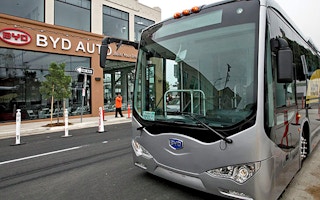BYD Co, the Warren Buffett-backed Chinese auto-and-battery maker, is seeking to increase overseas sales of its electric bus as billionaire founder Wang Chuanfu predicts a “second takeoff” for the company this year.
Shenzhen-based BYD has signed contracts this year to supply a total of 35 K9 electric buses to Long Beach and Los Angeles for use in public transportation. It also won an order in the Netherlands, and began trials in Poland and Canada.
“The K9 is doing well and has good prospects in overseas markets,” Wang, who has an estimated net worth of $2.2 billion according to the Bloomberg Billionaires Index, said in e-mailed comments. “In the future, BYD will closely monitor overseas markets, seek partnership opportunities, and progressively introduce new-energy vehicles to related countries.”
BYD is stepping up its push into overseas markets as Wang completes a three-year restructuring of the company. In that time, profit tumbled 97 percent because of losses at its photovoltaic business, a decline in global battery demand and a slump in vehicle deliveries.
The company’s shares have more than doubled in the past year, as Wang cut the number of dealerships and state incentives helped narrow solar losses. “Electric buses have high margins and selling them overseas will help build and shape BYD’s brand,” said Ricon Xia, a senior analyst with Mitsubishi UFJ Asset Management Ltd. in Hong Kong. Xia doesn’t have a rating on the stock.
US sales
BYD said in May that it will build two factories in Lancaster, California to assemble the K9 vehicles and produce the batteries that power them. The U.S. sales will mark BYD’s entry into the world’s largest economy, after missing its initial target to start retail sales of its e6 electric hatchbacks in the country by the end of 2011.
In China, BYD’s electric bus is in operation in cities including Shenzhen, Changsha, Xi’an, Tianjin, while 800 of its e6 all-electric cars are used as taxis in its home city.
BYD’s shares fell 1.3 percent to HK$30.35 today. The stock has surged 117 percent in the past year in Hong Kong, outperforming the 11 percent gain in the benchmark Hang Seng Index. The stock is still more than 60 percent below its October 2009 peak.
MidAmerican Energy Holdings Co., a unit of Buffett’s Berkshire Hathaway, took a 9.9 percent stake in BYD in 2009, paying HK$8 apiece for 225 million new shares.
Profit rebound
Most researchers covering the company remain skeptical. Just under 62 percent of the analysts who cover BYD have sell ratings on the shares, and the consensus of 13 analysts’ 12-month price targets is HK$19.42 according to data compiled by Bloomberg, 36 percent below today’s closing Hong Kong price.
“They are still exploring the appetite for electric buses,” said Harry Chen, a Shenzhen-based analyst with Guotai Junan Securities Co. “Unlike the domestic market, which can be easily influenced by government policies, the attraction of BYD’s electric buses still need to be tested.” Chen has a neutral rating on BYD.
The company in April forecast a 31-fold surge in first-half profit to as much as 500 million yuan($82 million) on rising auto sales, strong orders for its handset and assembly business and rising prices for photovoltaic products.
That marks a comeback from 2012, when profit tumbled after a collapse in photovoltaic prices and anti-dumping probes into Chinese solar-panel exports. At the same time, revenue from supplying mobile-phone batteries and components to customers including Apple Inc., Nokia OYJ (NOK1V) and Huawei Technology Co. fell 12 percent because of market competition and rising costs.
Auto sales
BYD’s auto sales have been pressured as China removed incentives in 2011 that spurred buying for cars with engines smaller than 1.6 liters, such as the company’s F3 compact car. The automaker also added too many dealerships, resulting in losses and steep discounting. BYD has since cut its number of sales outlets by a third to 800 and increased its focus on research and development to improve its products, Wang said.
“Excessive growth made us neglect the existence of some problems,” Wang said. “We began to adjust our channels, enhance our branding construction, and improve quality at the same time.”
BYD’s funds are in “good condition” and the company has “sufficient capacity to meet the daily liquidity, investment demand and debt repayment,” Wang said. The company has “a variety of different ways of financing to meet business needs,” he said in the e-mail, without being more specific.
Wang said BYD will remain in the solar-panel, battery and auto businesses as part of the company’s vision to create a “zero-carbon and zero-emission eco-environmental system.”
“BYD’s new energy strategy is to use solar panels to transfer energy to battery energy-storage stations that can then be used to charge electric vehicles,” Wang said. “The three businesses are interconnected and produce economies of sale that create a market barrier to competitors.”

















